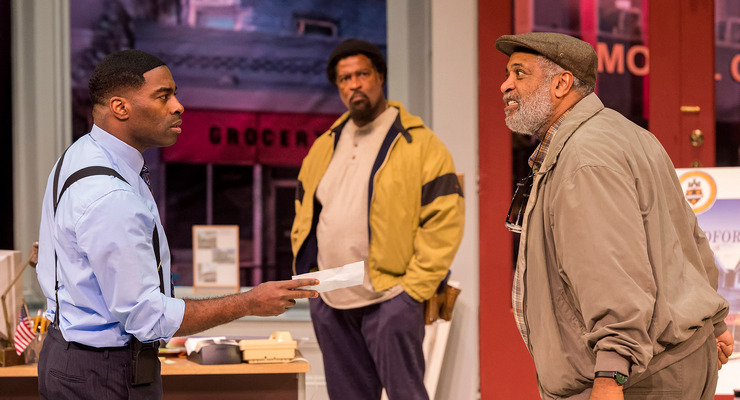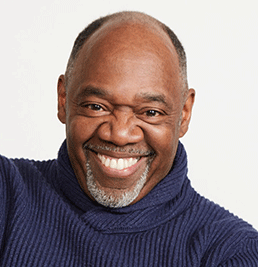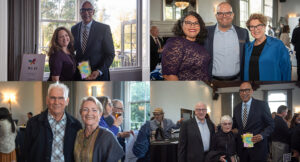
Christian Telesmar, Matt Orduña, and Alex Morris in Radio Golf at A Noise Within Theater in Pasadena. [Photo by Craig Schwartz]
The New York Times referred to Pulitzer Prize-winner August Wilson as “theater’s poet of Black America.” His American Century Cycle, a series of ten plays that chronicled the American Black experience in 20th Century Pittsburgh, his hometown, reignite America’s never-ending racial conversation with each performance.
The final play in the series, begun in 2005 with Gem of the Ocean, is Radio Golf, opening this week in previews at A Noise Within Theater, which recently presented Wilson’s Seven Guitars, another in the historic cycle.
In Radio Golf, Harmond Wilks, Pittsburgh’s first Black mayoral candidate, finds himself on the verge of the business breakthrough of a lifetime. The arrival of an unexpected visitor and some surprising news pits Harmond’s personal aspirations against his own integrity.
Pasadena Now talked with the play’s director Gregg T. Daniel recently as he laid out the 1997-era play’s message and importance in today’s post-George Floyd American landscape.
Radio Golf’s characters are far removed from that milieu, Daniel explains. But then again maybe not.

Director Gregg T. Daniel [Photo courtesy of A Noise Within]
“And one thing that August Wilson demands in his plays,” Daniel continues, “is that we acknowledge and recognize and accept even the pain and pleasures of the past for us to know who we are in the present and to move forward.”
Two of the central characters have somehow become disconnected, Daniel explains, or maybe assimilated.
“One, Harmond Wilks, has gone to Cornell,” Daniel notes. “He’s come back to the place where he grew up, but all he can think of is making everything new. He’s presenting new buildings, rebuilding his district, without having an appreciation for what this district meant to the black community during that time.”
“So here we are in 1997,” says Daniel, “with an African American male who has agency, has social mobility, but is not acknowledging or recognizing those sacrifices in how important that building was to the community. It essentially helped him get to where he is today. So it’s really this character reconciling with that, understanding it, accepting it, and reconciling with it before he goes on.”
Adds Daniel, “It’s not the same character we meet in the beginning of the play that we leave by the end of the play.”
As Wilks struggles with the challenges of community and gentrification, Daniel points out that the modern African American challenge is far removed from the historic 60s Civil Rights struggle that frames an older African American generation, of which he is a part.
But the struggle remains in a new manifestation.
“I’m a child of the Civil Rights Movement,” Daniel said. “My seminal times were in the sixties and seventies, when we were striving to just even get black offices in schools, we had no Black Studies.
“Thank God today, our kids aren’t striving for that,” he continued. “They’re not struggling to have a James Baldwin or Toni Morrison or struggling to have them recognized as legitimate sources of literature. But in the struggle that we ensue, that ensued for us, we enable.”
As Daniel views the current landscape, he appreciates that there exists a Black Studies Division now in every major college and every major university in the US, “because of the protests and the sit-ins and the marches, and those, unfortunately, who gave their lives in order to strive for those very freedoms. So you could have choices and Black and Indigenous People of Color could major, and actually get a major degree in anything, because of our sacrifices.”
Daniel continued, “This is why there’s black studies and Dr. Henry Louis Gates is now the head of Harvard’s African American studies department, because of the struggles of those from the fifties and the sixties.
“This is why we have agency now, “ said Daniel, “because we can look at the past and see how passionately, how devotedly, how fearlessly and courageously others before us fought for those very freedoms that we’re enjoying today.”
And now Black Lives Matter is acknowledging that there are still struggles, but, says Daniel, “We can build on those struggles from seeing examples of the past. I mean, this country has gone through seismic changes in the last two years, and I think as their direct results of the murder of George Floyd and Breonna Taylor and Ahmaud Arbery, others and others, and the incredibly violent relationship between law enforcement and inner city communities, and now the youth, they in their own way.”
But Gregg is heartened by the fact that he sees “so many different kinds of people protesting for the same things. Then I go, ‘Okay, they’re doing it in their way, but they’re still asking for equal rights. They’re still saying, ‘this isn’t right.’
Thus Wilk’s struggle becomes timeless and universal, like all of the best stories and dramas throughout history.
August Wilson’s Radio Golf, runs through Nov 13, 2022, at A Noise Within Theater, 3352 E. Foothill Blvd. Pasadena, CA. (626) 356-3100. www.anoisewithin.org






